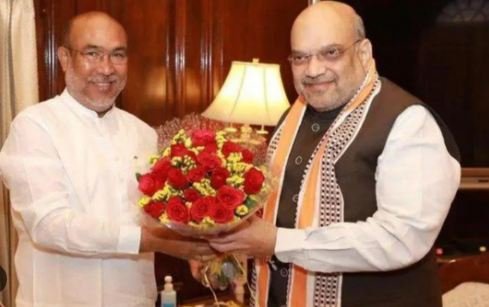New Delhi/ August 10, 2023 (SPN) | In a new development, Union Home Minister Amit Shah has taken a decisive step towards promoting peace. While addressing the Parliament yesterday, he appealed to both the Meitei and Kuki communities, urging harmony and understanding among them. Concurrently, Amit Shah has staunchly supported Manipur CM N Biren Singh.
Amit Shah’s proactive stance comes amidst tensions between the Meiteis and Kukis. With a focus on fostering amicable relations, he has chosen to use his influential position to advocate for unity. This move is particularly significant given the historical backdrop of conflicts between these communities.
Shah was speaking in the Lok Sabha, during the debate on the no-confidence motion moved by the Opposition against the Narendra Modi-led government. The Home Minister emphasized the importance of dialogue and cooperation in his appeal.
He underscored the shared values and heritage that connect the Meiteis and Kukis, suggesting that a strong bond between them can greatly contribute to the state’s progress.
Addressing the opposition who might question his support for the Manipur CM, Shah firmly defended his stance. He highlighted the Chief Minister’s dedication to the welfare of the state and its people. Shah asserted that backing the CM aligned with the government’s commitment to ensuring the prosperity of Manipur.
He stated that the imposition of President’s Rule or removal of a CM was only needed in case a CM was not “cooperating” with the Centre. N Biren Singh had cooperated in all interventions, the Home Minister said.
The Home Minister, Amit Shah, delved extensively into the sequence of incidents that have incited ethnic tensions in the northeastern state. He began by highlighting the six years of tranquility that the State enjoyed under the governance of the BJP-led administration.
During this period, Manipur remained free from curfews, a stark contrast to the prior years marked by prolonged ethnic conflicts resulting in extended periods of bandhs and blockades.
Attributing the current chain of events to the military junta’s seizure of power in neighboring Myanmar, Shah pointed out the opposition posed by the Kuki Democratic Front within Myanmar. This opposition prompted an influx of Kuki refugees into both Mizoram and Manipur.
To address the situation, proactive measures were taken, such as initiating border fencing in previously unprotected areas. Additionally, biometric records were established for the refugees, generating identity cards. These cards, in turn, placed them on a negative list for electoral rolls and Aadhaar enrollment.
Drawing parallels from historical incidents of ethnic clashes in Manipur, the Home Minister, Amit Shah, highlighted instances from the past where discussions were either absent or only the Minister of State for Home offered a response.
Shah emphasized that questions had arisen about Prime Minister Modi’s silence on the current issue, disregarding the fact that a similar clash in 1993 had garnered a response solely from then-Minister of State for Home, Rajesh Pilot. The comparison underscores that such incidents have previously elicited limited official responses.
A notable point mentioned by Amit Shah was his own engagement with the situation. He shared that he spent three days in the state, indicating his direct involvement and commitment. Furthermore, his Minister of State, Nityanand Rai, dedicated an extensive 23 days to the situation on the ground.
In a resolute tone, Shah called for the avoidance of politicization surrounding the issue of ethnic violence. He emphasized the importance of recognizing it as a matter of communal conflict rather than a subject for political maneuvering.
Shah’s actions and statements send a clear message: unity is pivotal for the growth of Manipur. While acknowledging the complexities of the situation, he remains resolute in his efforts to bring about reconciliation.
This approach not only reflects his diplomatic acumen but also showcases his commitment to securing a peaceful and thriving Manipur.
Signpost News is an Imphal-based media house that focuses on delivering news and views from Northeast India and beyond.

